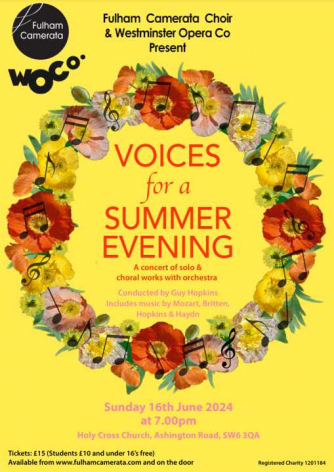Details
Holy Cross Church
Ashington Road
Parsons Green
Fulham
London
SW6 3QA
England
Programme
Wolfgang Amadeus Mozart – Exsultate Jubilate, K.165/158a
Benjamin Britten – Serenade for Tenor, Horn and Strings, Op.31
~ Interval ~
Alexander Hopkins – Visit, we beg Thee, O Lord
Joseph Haydn – Mass no.6 in G major 'Nicolaimesse', Hob XXII:6
Performers
Dominic Bevan – tenor
Ceferina Penny – soprano
Benjamin Hartnell-Booth – Horn
Alexander Hopkins – Bass
Katherine Gregory – mezzo-soprano
Guy Hopkins – Conductor
Westminster Opera Company
Fulham Camerata
Programme Note
Exsultate Jubilate was written when Mozart was still only 16, and first performed in Milan shortly before his 17th birthday in January 1773. The piece is conceived as a kind of miniature vocal concerto with an expressive andante, a prayer to the Virgin, preceded by a short recitative and framed by two allegro movements, the virtuoso finale employing simply the single word: Alleluia!
Britten’s Serenade for Tenor, Horn and String Orchestra was written at the request of the Horn player Dennis Brain and first performed at the Wigmore Hall in London in 1943. The soloists at the first performance were Brain and Peter Pears who had recently returned to Britain with Britten from the United States where they had been for three years. It was enthusiastically received at its premiere in contrast to many of his pre 1939 works which had often been dismissed as ‘too clever by half’. Evidently some saw a fresh spirit in the new songs and it was true that by setting some classical English poets, largely on the advice of the young critic and writer Edward Sackville-West, he was perhaps breaking free from the not-always beneficial influence of W.H. Auden. Britten dedicated the Serenade to Sackville-West who wrote of the piece: The subject is Night and its prestigia [conjuring tricks]: the lengthening shadow, the distant bugle at sunset, the Baroque panoply of the starry sky, the heavy angels of sleep; but also the cloak of evil—the worm in the heart of the rose, the sense of sin in the heart of man. The whole sequence forms an Elegy or Nocturnal (as Donne would have called it), resuming the thoughts and images suitable to evening. Britten employs a framing device with the Horn performing a solo Prologue and Epilogue using the natural harmonics of the instrument. This is similar to the plainsong framing in the Ceremony of Carols.
The text for Visit, we beg Thee, O Lord, originally in Latin, has been a traditional part of Compline services in the Christian tradition since the fifth century. It is a beautiful prayer for the evening, asking God and his Angels to watch over us during the night. There are many themes and emotions there for a composer to explore – the presence of God, the enemy, the Angels, peace, blessings. The gradual build from the opening single note in the strings to the repeated clusters of ‘we beg thee’ to the sudden softness of ‘O Lord, this dwelling’ presents a picture of fervent prayer to God, which gives way to the far darker, more mysterious middle section – ‘the snares of the enemy’. The broad, grandiose chords of ‘let thy holy Angels’ offer a more hopeful prayer, leading to a passionate, pleading, call for God’s blessing to ‘always be upon us’. The piece then builds to the final ‘Amen’, ending the piece on an optimistic note. The combination of choir and string orchestra creates a rich, warm soundscape. This performance for voices and strings is the premiere of this piece commissioned by Fulham Camerata in 2024.
The name Missa Sancti Nicolai refers to the dedication of the mass to St Nicholas whose feast day is 6 December. The mass is a particularly charming and lyrical work with a pastoral quality, and it remains popular in the repertoire to this day. Haydn effects an ingenious shortcut in the Credo by layering different sections of the (long) text in the first section to speed things up. The finale Dona Nobis Pacem reprises the opening music of the Kyrie, a fairly frequent device of the era.

 Your events at Classical Events
Your events at Classical Events

